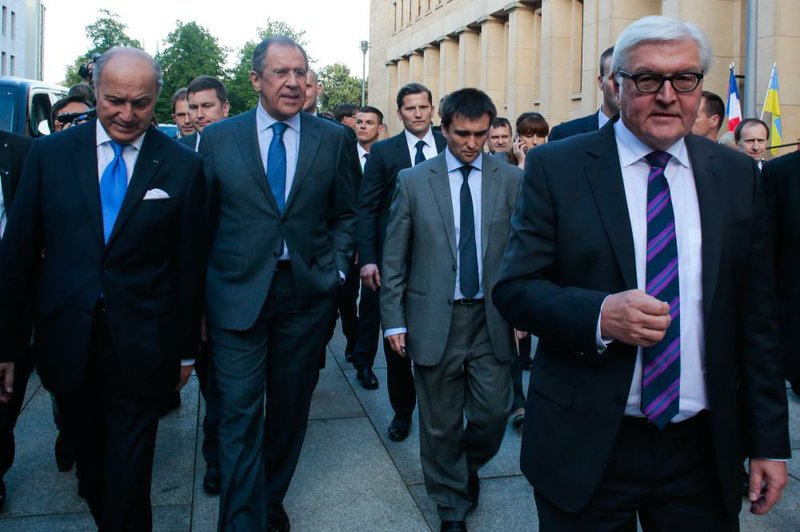BERLIN -- Foreign ministers from Russia, Ukraine, Germany and France agreed Wednesday on a series of steps for a resumption of the cease-fire in eastern Ukraine, where fighting between government troops and pro-Russia separatists has taken more than 400 lives since April.
The steps include reopening talks no later than Saturday "with the goal of reaching an unconditional and mutually agreed sustainable cease-fire" to be monitored by the Organization for Security and Cooperation in Europe, their declaration said.
Fighting in eastern Ukraine has increased since a much-violated 10-day cease-fire expired late Monday. Four Ukrainian troops were killed as government forces carried out more than 100 attacks on rebel positions, a military official said.
Russia supports the proposal to give Ukrainian border guards and representatives of the organization access to Russian territory to take part in controlling two border crossings once the cease-fire is in place, Russian Foreign Minister Sergey Lavrov said after the talks in Berlin.
Border posts have become a key issue, because Ukraine and the United States have said military equipment and reinforcements are flowing across the border from Russia. Moscow denies arming the rebels and describes Russian citizens fighting with them as volunteers.
Asked whether Russia has any influence over the rebels, Lavrov said, "We have possibilities to influence those who defend their families, their soil and their territory."
Lavrov stressed that Russia would not allow the cease-fire to be used to give the military time to regroup and gather reinforcements, as the separatists accused the troops of doing during the previous cease-fire.
The ministers' declaration specifically states that the cease-fire negotiations will be handled by the so-called contact group, something Russia has insisted upon. The group, which already has held two rounds of peace talks, includes Ukrainians trusted by Russia, the Russian ambassador and separatist leaders.
German Foreign Minister Frank-Walter Steinmeier expressed hope that the group would meet before Saturday, calling it "a first and an important step." It wasn't clear where the meeting would take place.
Ukraine's foreign minister, Pavlo Klimkin, blamed the failure of the previous cease-fire on the separatists and said that "to have a sustainable cessation of violence, we have to act together."
Since the earlier cease-fire expired, three troops have died in clashes with rebels and 10 have been wounded, National Security and Defense Council spokesman Andriy Lysenko said. The federal border guards said one guard was killed when rebels attacked the Novoazovsk crossing point with mortars in the Donetsk region.
Donetsk is one of two eastern regions where separatists have declared independence from the government in Kiev. Ukrainian officials said pro-Russia rebels had been forced out of three villages.
Ukraine said it recaptured a key border post Tuesday at Dovzhanskiy, which rebels had mined with explosives.
Another main border crossing at Izvaryne was closed Wednesday because of fighting. Ukrainian officials said rebels shelled Ukrainian troops in the area and a Ukrainian armored vehicle was destroyed by a mine.
At the small Sjevernyi border crossing to the north, Ukrainian border guards had abandoned their post, leaving three Russian border guards to process the several dozen Ukrainians who passed through Wednesday afternoon.
Fighting also was underway Wednesday in Luhansk, the other eastern region where separatists have declared independence. In the city of Luhansk, a stray missile hit a school near a rebel position but no injuries were reported.
Before the foreign ministers met, German Chancellor Angela Merkel said she "cannot rule out that we will have to go further" in imposing sanctions on Russia.
The European Union and the United States have already imposed targeted sanctions mostly hitting individual officials in Russia and have held off on more costly sanctions on entire industries.
The White House said it was "unfortunate" that Russian-backed separatists had not abided by the terms of the cease-fire or provided the assurances that would have enabled Ukrainian President Petro Poroshenko to extend it.
"A unilateral cease-fire doesn't work, at least as a prolonged strategy," spokesman Josh Earnest said on Wednesday. "Unfortunately, in this case, it only fueled separatist violence and allowed the separatists to make further advances."
Information for this article was contributed by David McHugh, Geir Moulson, Balint Szlanko, Darlene Superville and Lynn Berry of The Associated Press.
A Section on 07/03/2014


